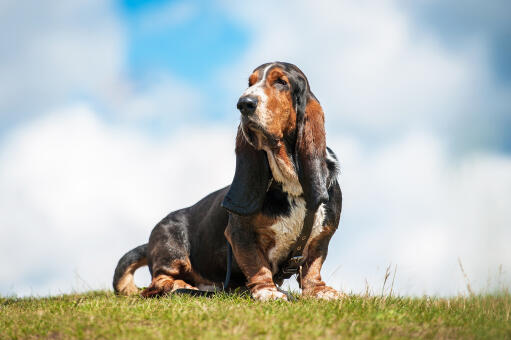Basset Hound Dogs












History
The six breeds of 'Basset' dogs, including the famous Basset Hound, were developed as hunting dogs in France. Their prey was small and fast - rabbits and hares, mainly. The name basset comes from French 'bas', meaning 'low', with the suffix '-et' implying 'rather low', in reference to their short-legged appearance. They used to be smaller, actually, and it was not until Bloodhound crosses were brought into the mix in the 1870s and '80s that the breed attained its modern form and girth. They have been popular in the UK since that time, and have been popular in the US since the 1920s (after Time magazine featured a Basset hound on its front cover in February 1928).
Their lugubrious faces have made them popular as the basis for cartoon characters such as Droopy, Fred Basset, and the Sherlock Holmes Hound in The Great Mouse Detective. They are the abiding symbol of Hush Puppy shoes, too. They have featured in dozens of movies and TV shows too, including Smokie and the Bandit, Columbo, and the Dukes of Hazzard.
Behaviour
Basset Hounds are friendly, good natured and calm. They mix well with other dogs, pets, and children, and are happy to meet strangers. Sometimes dubbed 'The Clown of the canine world', as they are always up for a bit of fun, and appreciate a good mixture of company, unhurried walks outdoors, and plenty of sleep on your lap or on the sofa. They give the impression that they don't need too much walking, but require plenty of it to prevent obesity.
Bassets are food-motivated, and will steal food given half a chance. They are slaves to their noses, and may suddenly run off after a scent and not come back, no matter how you call and whistle and cajole. Walking them on a long lead or in a secure area is required. once they have picked up a scent they will 'sing' or 'bay'. This tracking instinct makes training a challenge, as it does with all the Bassets, but the fact that they are motivated by food helps here. Training is slow, but manageable, with a lot of patience, consistency, and a mixture of firmness and fairness.
The Basset Hound's smooth coat makes grooming easy. The one bit of grooming they need some help with is their face - these will need regular washing as the dogs have 'slobbery' mouths and tend to drool a lot. Their stocky frame and short legs makes them prone to back problems, and they need lifting into cars or onto furniture. Preventing hem from going up and down/on and off stairs and furniture when young will help prevent this becoming a problem in later life.
Varieties
Bicolors or tricolors of standard hound coloration. Generally black, white and tan (tri-color) or tan/lemon and white (bi-color); but other standard hound colors too.
Temperament
There is probably no dog more lovable and friendly than the Basset Hound. They are good-natured to a fault, emotional, and loving. They are chilled out, and although they need plenty of steady walks, these will be unhurried affairs. Bassets enjoy the outdoors and lazy indoors equally.
Calm and docile with children and other dogs, these are great family pets. Don't expect a bouncy, playful dog, just a lovable companion that will enjoy your company, and will be off sniffing and drooling at any scent that comes his way.
Health Problems
Basset Hounds are prone to canine hip dysplasia (CHD), elbow dysplasia, ear problems, eye problems, bloat, and Von Willebrand's Disease (a usually mild bleeding disorder).
Breed Details
- Status: Common
- Life Expectancy: 11 - 12 years
- Weight: 55 - 75 lb
- Height: 11 - 15"
- Rare: No
- Coat: Short
- Grooming Requirements: Once a week
- Town or Country: Either
- Minimum Home Size: Large House
- Minimum Garden Size: Small to Medium Garden
- Breed Type: Hound
- Size: Large
- Energy Level: Medium
- Exercise Required: Up to 1 hour














